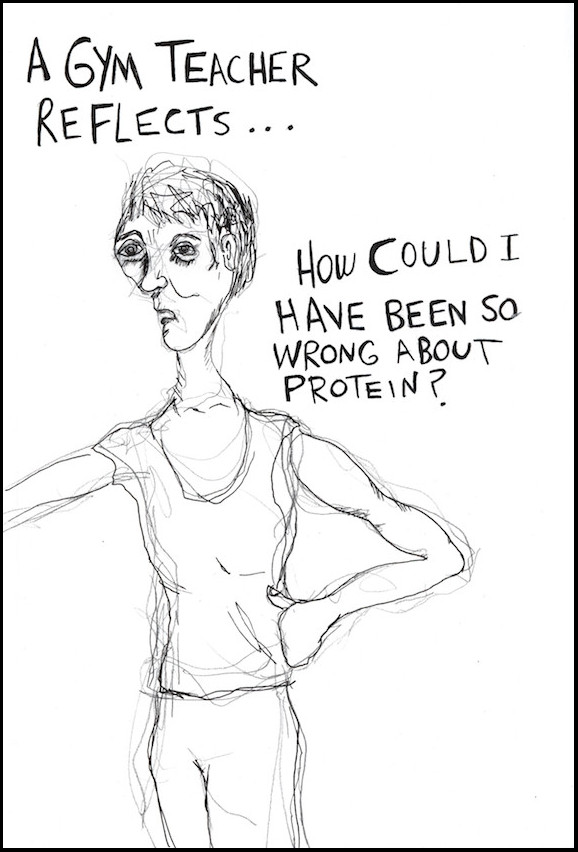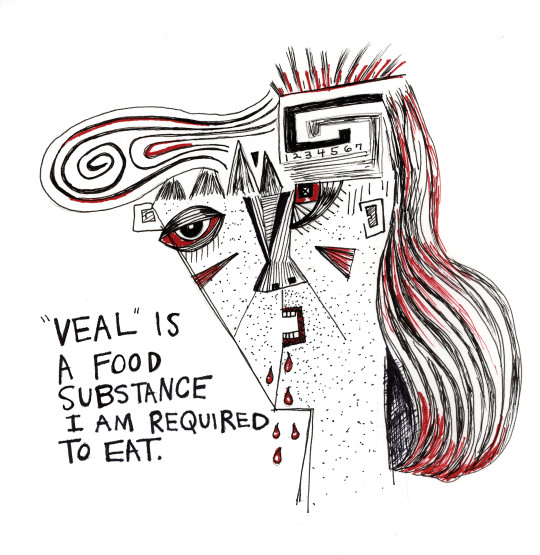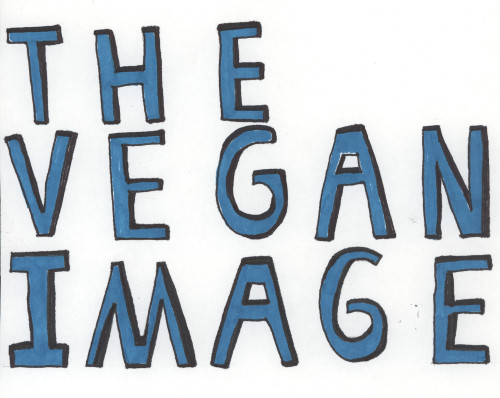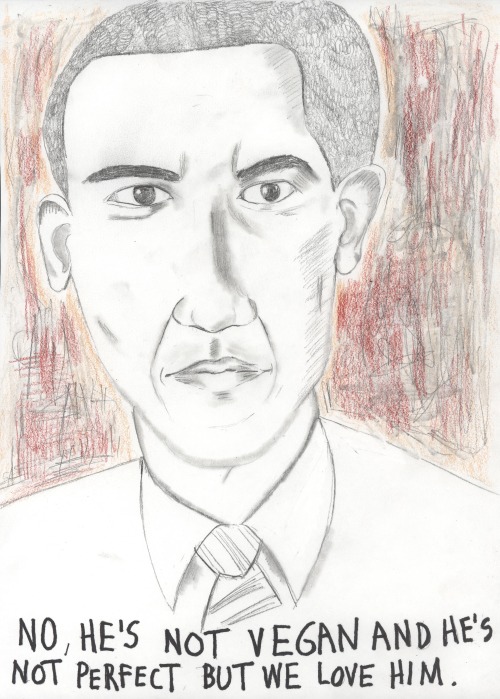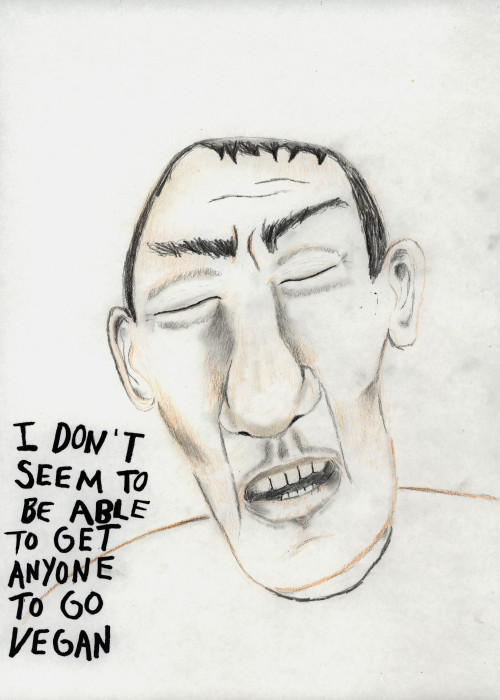
By Leslie Goldberg
It’s the old pitch: “heart disease, blah, blah, blah, diabetes, blah, blah, blah, cancer, blah, blah, blah, cholesterol, blah, blah, blah, obesity, blah, blah, blah, saturated fat, blah, blah, blah, arthritis, blah, blah, blah and on and on and on.
Their eyes glass over and then they say, “Protein, blah, blah, blah, calcium, blah, blah, blah, omega 3’s, blah, blah, blah,” and/or “My uncle ate eggs, steak and cheese every day of his life and he lived to be 117.”
And, maybe, maybe, maybe, “OK, OK, OK, I’ll try it.”
Another ex-vegan is born.
Actually, when you think of it, why would anybody think they could persuade anyone to do anything based on health? Have you ever gone to a birthday party and said, as the cake was being cut, “You know we shouldn’t eat this because it’s bad for us.” Or maybe, you’re at a ballgame and your friend is just about to bite into a hot dog and you say that could give you cancer or a heart attack.”
What about saying to someone who has just settled into a little TV watching that they should really be out there running?
I changed my eating because of the animals. I just couldn’t be a part of the holocaust. But I didn’t think other people would be moved to go vegan because of that. I pitched to friends’ and family’s self-interest. I talked about health and weight and I talked about health and weight some more. Talk, talk, talk, until it was suggested that I do something that is anatomically impossible.
The reason the health argument doesn’t work is that it depends on human will-power. Is there any power on earth weaker than that? Cheese, which contains an opiate called casomorphin, is actually physically addictive. It takes about 10 pounds of milk to produce one pound of cheese. “Like it or not, mother’s milk has a drug-like effect on the baby’s brain that ensures that the baby will bond with Mom and continue to nurse and get the nutrients all babies need,” said Dr. Neal Barnard, founder of the Physician’s Committee for Responsible Medicine.
Cow’s milk is “mother’s milk,” folks, just not your mother’s milk.
In addition to addiction, animal rights activists are up against an inescapable, 24-7 barrage of milk, meat, dairy and fish advertising and lobbying. (Remember, if those stupid and insulting ads didn’t work, they wouldn’t spend billions on them.)
Recently I found another clue as to why the vegan health argument doesn’t work in an article by New York Times columnist Jane Brody. In it, she wrote about a new book by Michelle Segar called “No Sweat: How Simple Science of Motivation Can Bring You a Lifetime of Fitness.”
Segar, who is the director of the Sport, Health and Activity Research and Policy Center at the University of Michigan, told Brody, “Health is not an optimal way to make physical activity relevant and compelling enough for most people to prioritize it in their hectic lives.”
Brody went on to write, “Though it seems counterintuitive, studies have shown that people whose goals are weight loss and better health tend to spend the least amount of time exercising.
“Rather, immediate rewards that enhance daily life – more energy, a better mood, less stress and more opportunity to connect with friends and family offers far more motivation, Dr. Segar and others have found,” she wrote.
Doing the right thing, i.e., stopping the exploitation of animals in our daily lives is also something that offers immediate rewards. Suddenly a weight of guilt is lifted. Nothing offers a better sense of well-being than knowing you’re living in accordance with your deepest values.
Esteemable acts create self-esteem.
It’s not rocket science: When you’re doing shitty stuff, you feel shitty.
Animal agriculture is torturing and murdering animals – you would have to be living under a rock to not know that. It takes a lot of energy to keep trying to push away awareness. Become truly aware and whoosh! Feel the energy.
Yet, standing up for animals can be a lonely job in this society. And you might not feel that great arguing with family and friends. You might not feel that great not arguing with family and friends and keeping everything inside yourself.
Perhaps, try not arguing AND speaking up for animals. Something small. A friend of mine, Mike, works at a place where the management serves lunch. There’s nothing for him to eat so he goes out and gets his own food. When his co-workers would ask him why he did that, he used to say, “because I’m vegan.” Now he says, “I don’t eat animals.”
Mike has also found that the very best solution to the “Lonely Vegan Syndrome” is finding friends who are also working for Animal Liberation, ideally an animal rights group that gets together for not only protests, but for fun.
Last week I went to “Pizza Night” at the Direct Action Everywhere (DxE) House. I had several kinds of pizza including some chocolate, banana and brown sugar pizza (I hate that expression, “to die for,” but in the case of that chocolate pizza it seemed right on.) The get-together was fun and a lot of friends were there as well as several newcomers.
It made my day. Well, that and going to the gym.
P.S. I once chatted with one of the godfathers of the vegan health movement Dr. John McDougall. McDougall has been in the trenches for decades. He knows what plant-based doctors are up against. He knows the truly depressing recidivism rates among people who try a vegan diet. I was talking with him about some animal rights activism I was doing and he said, “It’s you guys (meaning the animal rights acitvists) who are going to make this whole thing happen.”
– A Vicious Vegan blog post –
(By the way, my new book of humerous drawings, The Sex Lives of Cats, has just been published. Check it out here.)

